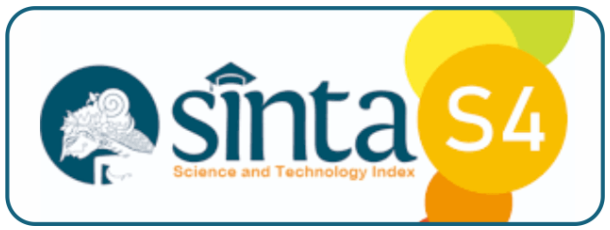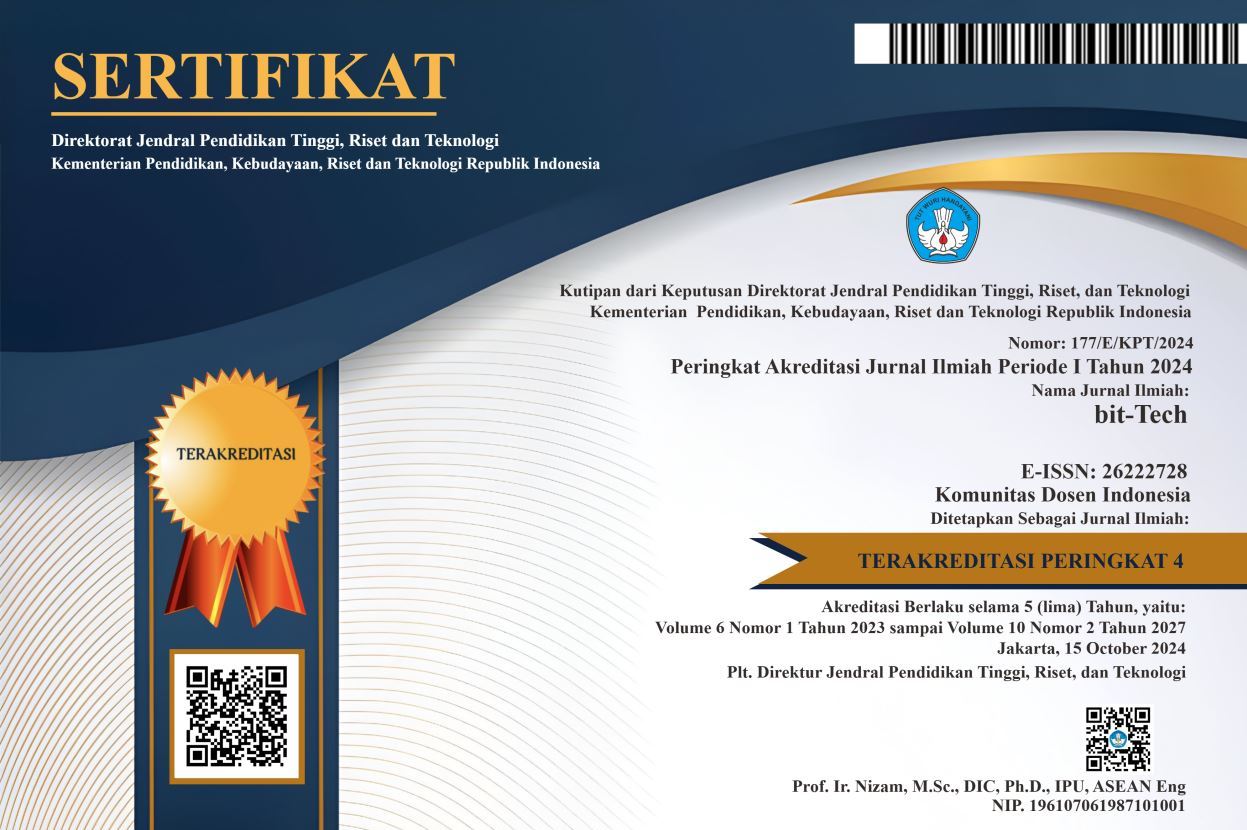Decision Support System for Recommendation Sharia Banking Investment Products Using Simple Additive Weighting (SAW)
DOI:
https://doi.org/10.32877/bt.v7i2.1872
Keywords:
DSS, Funding, Investment, Sharia Bank, Simple Additive Weighting
Abstract
The swift expansion of Islamic banking has resulted in the creation of many investment products, such as mudharabah deposits, sukuk, and Islamic mutual funds, all compliant with sharia rules. Notwithstanding this advancement, the customers' inadequate financial literacy presents considerable obstacles in identifying appropriate investment alternatives that correspond with their objectives and risk appetite. This work seeks to fill this gap by creating a Decision Support System (DSS) that employs the Simple Additive Weighting (SAW) method to aid users in making educated decisions on Islamic banking investments. The SAW technique was selected for its straightforwardness and efficacy in normalizing data and assessing alternatives according to established criteria, including profit potential, risk level, investment duration, and compliance with sharia principles. The research encompassed multiple phases, including the identification of evaluation criteria, the collection and analysis of pertinent data, and the application of the SAW method to rank investment choices. The DSS effectively delivered precise and dependable suggestions, designating Sharia Deposits as the optimal investment choice due to its robust agreement with the established criteria. The results underscore the system's capability to improve financial inclusion and literacy, especially in Indonesia, where comprehension of sharia-compliant financial products is still inadequate. Future improvements to the DSS involve the incorporation of real-time data and the expansion of its application to include more financial industries, such as insurance and microfinance. This study highlights the importance of utilizing technology to address deficiencies in financial literacy and facilitate the sustainable development of the Islamic banking sector.
Downloads
References
M. A. Ledhem, “The financial stability of Islamic banks and sukuk market development: Is the effect complementary or competitive?,” Borsa Istanbul Rev., vol. 22, pp. S79–S91, 2022, doi: 10.1016/j.bir.2022.09.009.
F. Fitriyanti, M. F. Akbar, A. P. Syamsu, and R. F. Nurhaifa, “Application of Sharia Principles in Sharia Financial Institutions,” Fiat Justisia J. Ilmu Huk., vol. 17, no. 2, pp. 157–166, 2023, doi: 10.25041/fiatjustisia.v17no2.2849.
Global Islamic Liquidity Management Report, “Building a Robust and Resilient Ecosystem Global Islamic Liquidity Management Report 2023,” 2023.
M. F. Hadziq, Y. Mardoni, I. Solihat, and M. Rahmanto, “Analysis of the Effect Spin-Off Increasing Shariah Compliance in Indonesian Islamic Bank,” Proceeding Int. Semin. Business, Econ. Soc. Sci. Technol., vol. 3, no. 1, pp. 184–190, 2023, doi: 10.33830/isbest.v3i1.1489.
U. Islam, N. Sunan, and U. I. Indonesia, “Sharia investment Challenges and Growth for Sustainable and Inclusive Financial Equality in Digital Innovation Mohammed Kenneh,” vol. 3, no. 1, pp. 1–11, 2024.
I. Amalia and A. Widyasanti, “PRESS RELEASE OJK AND STATISTICS INDONESIA PRESENT NATIONAL SURVEY ON FINANCIAL LITERACY AND INCLUSION 2024 FINDINGS,” OJK, pp. 75–77, 2024.
I. R. Purbaningrum, N. Luthfia, and A. Nasim, “The Problems of Sharia Investment in Indonesia from The Perspective of Maqashid Al-Sharia,” Islam. Res., vol. 7, no. 2, pp. 229–236, 2024, doi: 10.47076/jkpis.v7i2.306.
S. ul Rehman, I. Wani, M. Khanam, and Y. S. A. Almonifi, “A Brief Review of Growth and Development in Islamic Banking,” SSRN Electron. J., no. June, 2021, doi: 10.2139/ssrn.3867044.
B. Khalidin, A. Musa, and A. Kiawan, “Murabaha Financing of the Indonesian Islamic Banks Under an Islamic Economic Law and the Fatwa Dsn Mui,” Petita J. Kaji. Ilmu Huk. dan Syariah, vol. 8, no. 2, pp. 203–218, 2023, doi: 10.22373/petita.v8i2.238.
I. F. S. Board, Islamic Financial Services Industry Stability report 2024. 2024.
M.Fatchan, R. Pangestsu, and A. Firmansyah, “Sistem Pendukung Keputusan Pemilihan Saham Terbaik Untuk Portofolio Investasi Syariah Menggunakan Metode SAW,” J. Ilm. Intech Inf. Technol. J. UMUS, vol. 4, no. 1, pp. 141–152, 2022.
Yulhendri and S. V. Dero, “Sistem Pendukung Keputusan Pemilihan Saham Dengan Metode Electre,” J. Sist. Informasi, Akuntansi, dan Manaj., vol. 2, no. 3, pp. 324–336, 2022.
M. Irfan, Yanuardi, and N. Yudaningsih, “Implementasi Metode Weighted Product Pada Sistem Pendukung Keputusan Pemilihan Lembaga Bimbingan Belajar,” Bull. Comput. Sci. Res., vol. 3, no. 1, pp. 37–44, 2022, doi: 10.47065/bulletincsr.v3i1.195.
I. Andriyawan, D. Asmajarati, and A. Suwondo, “Sistem Pendukung Keputusan Pemilihan Instrumen Investasi Menggunakan Metode Simple Multi Attribute Rating Technique (Smart),” Biner J. Ilm. Inform. dan Komput., vol. 2, no. 1, pp. 65–75, 2023, doi: 10.32699/biner.v2i1.4238.
D. Pribadi, R. A. Saputra, J. M. Hudin, and Gunawan, Sistem Pendukung Keputusan. 2018.
G.-H. T. J.-J. Huang, Multiple Attribute Decision Making Methods and Application. 2011.
N. Rosanti, “Faktor yang Mempengaruhi Nasabah Memilih Tabungan Rencana di Makassar,” J. Manaj. Perbank. Keuang. Nitro, vol. 2, no. 1, pp. 9–14, 2019, doi: 10.56858/jmpkn.v2i1.13.
F. Fitriaty, M. H. Saputra, and D. Elliyana, “Analisis Faktor – Faktor Yang Mempengaruhi Keputusan Investasi Selama Covid-19 Di Bursa Efek Indonesia,” J. Manaj. Terap. dan Keuang., vol. 11, no. 2, pp. 324–334, 2022, doi: 10.22437/jmk.v11i2.18604.
R. Lisdayanti and L. Hakim, “Pengaruh pengetahuan investasi syariah produk investasi syariah dan modal minimal mahasiswa terhadap minat investasi Bank Syariah dengan risiko investasi sebagai variabel intervening pada mahasiswa Perguruan Tinggi Negeri Kota Surabaya,” J. Masharif al-Syariah J. Ekon. dan Perbank. Syariah, vol. 6, no. 1, pp. 13–28, 2021, [Online]. Available: http://journal.um-surabaya.ac.id/index.php/Mas/index
N. J. Haritz Harahap, Atika, “FAKTOR-FAKTOR YANG MEMPENGARUHI GAYA HIDUP SYARIAH, TINGKAT BONUS, BEBAS BIAYA ADMINISTRASI DAN TINGKAT KEAMANAN TERHADAP KEPUTUSAN NASABAH MEMILIH PRODUK TABUNGAN EASY WADIAH (STUDI KASUS BANK SYARIAH INDONESIA KC MEDAN GAJAH MADA),” vol. 07, no. 02, pp. 1–14, 2023.
Sune Ferreira-Schenk and Z. Dickason-Koekemoer, “Analysing the Factors Affecting the Long-term Investment Intention of Investors,” Int. J. Econ. Financ. Issues, vol. 13, no. 1, pp. 112–120, 2023, doi: 10.32479/ijefi.13640.
M. Hasan, M. I. Ahmad, M. Y. Rafiq, and R. U. Rehman, “Dividend Payout Ratio and Firm’s Profitability. Evidence from Pakistan,” Theor. Econ. Lett., vol. 05, no. 03, pp. 441–445, 2015, doi: 10.4236/tel.2015.53051.
D. Agestia and Khairunnisia, “Pengaruh firm size, price earning ratio, dan book to market ratio terhadap return saham,” J. Akunt., vol. 6, no. 2, pp. 215–226, 2013.
B. Heradhyaksa and U. Baroroh, “Sharia Stock Investment as a Strategy for Strengthening the Economy of the Riau Border Region,” in Proceedings of the International Seminar on Border Region (INTSOB 2023, Atlantis Press SARL, 2024, pp. 21–27. doi: 10.2991/978-2-38476-208-8_5.
A. Maftukhah, “The Performance of Sharia Equity Fund Investment Manager,” J. Iqtisaduna, vol. 1, no. 1, p. 81, 2020, doi: 10.24252/iqtisaduna.v1i1.16056.
A. Alam, R. T. Ratnasari, W. Sawinda, and M. H. Al Hakim, “How does Sukuk Investment Perform? A Literature Review,” Int. J. Prof. Bus. Rev., vol. 8, no. 7, p. e02580, 2023, doi: 10.26668/businessreview/2023.v8i7.2580.
M. F. Fahmi, B. Mutafarida, and A. H. Fajrin, “The Concept of Profit Sharing on Deposits Sharia in Islamic Bank for Non-Muslim Market,” J. Masharif al-Syariah J. Ekon. dan Perbank. Syariah, vol. 7, no. 4, pp. 1562–1577, 2022, [Online]. Available: https://journal.um-surabaya.ac.id/index.php/Mas/article/view/18036
D. Pratiwi, S. D. Sabbar, K. N. Salam, U. Islam, N. Alauddin, and U. Hasanuddin, “Application of the Basic Concept of Islamic Economics To the Effectiveness of Sharia,” Researchgate.Net, vol. 2, no. November, pp. 731–746, 2022, [Online]. Available: https://www.researchgate.net/profile/Dhita-Pratiwi-Ar/publication/370737177_APPLICATION_OF_THE_BASIC_CONCEPT_OF_ISLAMIC_ECONOMICS_TO_THE_EFFECTIVENESS_OF_SHARIA_PROPERTY_COMPANIES/links/645f8c41fbaf5b27a4c4e441/APPLICATION-OF-THE-BASIC-CONCEPT-OF-ISLAMIC-
H. A. Juisin, M. A. S. Mohd Sayuthi, H. Amin, and I. M. Shaikh, “Determinants of Shari’ah gold investment behaviour: the case of Penang, Malaysia,” J. Islam. Mark., vol. 14, no. 12, pp. 3228–3246, 2023, doi: 10.1108/JIMA-11-2021-0360.
Downloads
Published
How to Cite
Issue
Section
License
Copyright (c) 2024 bit-Tech

This work is licensed under a Creative Commons Attribution-ShareAlike 4.0 International License.
I hereby assign and transfer to bit-Tech all exclusive copyright ownership rights to the above work. This includes, but is not limited to, the right to publish, republish, downgrade, distribute, transmit, sell, or use the work and other related materials worldwide, in whole, or in part, in all languages, in electronic, printed, or any other form of media, now known or hereafter developed and reserves the right to permit or license a third party to do any of the above. I understand that this exclusive right will belong to bit-Tech from the date the article is accepted for publication. I also understand that bit-Tech, as the copyright owner, has sole authority to license and permit reproduction of the article. I understand that, except for copyright, any other proprietary rights associated with the work (e.g. patents or other rights to any process or procedure) must be retained by the author. In addition, I understand that bit-Tech permits authors to use their papers in any way permitted by the applied Creative Commons license.


 DOI :
DOI :
 Abstract views: 88
/
Abstract views: 88
/  PDF downloads: 66
PDF downloads: 66











